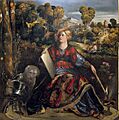Borghese Collection facts for kids
The Borghese Collection is a famous group of artworks gathered by the Borghese family in Rome. It includes amazing Roman sculptures, old paintings by masters like Caravaggio, Raphael, and Titian, and ancient Roman art. Cardinal Scipione Borghese started this collection in the 17th century. He bought many pieces from top artists and sculptors of his time. For example, he asked Gian Lorenzo Bernini to create two portrait busts. Most of the collection is still together and can be seen at the Galleria Borghese. However, some classical sculptures had to be sold to the Louvre museum in 1807.
Contents
Scipione Borghese: The Collection's Founder
Cardinal Scipione Borghese was a very important art collector. He was the main person who started and built this huge collection. People even wrote poems about his collection as early as 1613! In 1607, the Pope gave the Cardinal 107 paintings. These paintings had been taken from the studio of the artist Cavalier D'Arpino. The next year, Raphael's famous painting Deposition was taken by force from a church in Perugia. It was then brought to Rome and given to Cardinal Scipione by a special order from the Pope.
Later Art Additions
In 1682, more artworks joined the Borghese collection. These came from the inheritance of Olimpia Aldobrandini. This included pieces from the collections of Cardinal Salviati and Lucretia d'Este.
Where the Collection Lived
Scipione Borghese turned a large estate and vineyard in Rome into a huge garden and group of palaces. This was called the Villa Borghese. He built it to hold his amazing art collection. He also used another villa, the Villa Mondragone, for this purpose.
In 1775, Prince Marcantonio IV Borghese wanted to honor his family. He and the architect Antonio Asprucci began to update the Villa Borghese. The Villa had been a public museum since the 1600s. They combined the Borghese sculptures with the grand Baroque ceiling decorations. This created a spectacular building that celebrated the Borghese family.
The Galleria Borghese Today
The Villa Borghese still holds a big part of the collection. It is now known as the Galleria Borghese. Many of the sculptures are still displayed in the exact spots they were meant for. This includes early works by the famous sculptor Gian Lorenzo Bernini.
Caravaggio's Masterpieces
The Galleria Borghese has several important paintings by Caravaggio:
- Boy with a Basket of Fruit
- St. Jerome
- Sick Bacchus
- John the Baptist (John in the Wilderness)
- Madonna of the Palafrenieri
- David with the Head of Goliath
- Portrait of Pope Paul V
Other Important Paintings
Here are some other famous paintings you can find in the collection:
- Deposition by Raphael
- Danaë by Correggio
- Portrait of a Man by Antonello da Messina
- Venus and Cupid by Cranach
- The Deposition by Rubens
- The Last Supper by Jacopo Bassano
- Various works by Federico Barocci
- Leda and the Swan by followers of Leonardo da Vinci
Bernini's Sculptures
The collection has a small but very important group of works by Gian Lorenzo Bernini. Scipione Borghese was Bernini's first supporter. In this collection, you can see Bernini grow as an artist. You can see his early, talented works like The Goat Amalthea with the Infant Jupiter and a Faun (1615). Then you can see his amazing and dynamic sculptures like Apollo and Daphne (1622–25) and David (1623). These are considered very important works of Baroque sculpture.
The gallery also has three busts by Bernini. Two are of Pope Paul V (1618–20). One is an incredibly lifelike and new kind of portrait of his supporter, Scipione Borghese (1632). Finally, there are some early, skillful works like Aeneas, Anchises, and Ascanius (1618–19). There is also a personal artwork showing an idea, called Truth Unveiled by Time (1646–52).
Borghese Art at the Louvre
In 1807, the Borghese family faced financial problems. Also, Napoleon Bonaparte, who was his brother-in-law, put pressure on Camillo Filippo Ludovico Borghese. Because of this, Camillo sold 344 ancient artworks to the French state. He sold them for less than they were worth. These pieces included 154 statues, 160 busts, 170 bas-reliefs, 30 columns, and various vases.
These artworks are now at the Louvre Museum in Paris. Some famous pieces include:
- Sculptures found recently at Gabii
- The Antinous Mondragone
- The Borghese Gladiator
- The Borghese Hermaphroditus
- The Borghese Vase
Camillo replaced these sold pieces with other artworks. He used pieces found during new digs on Borghese land. He also used paintings from the family's homes and storage areas. By the 1830s, the collection seemed full again despite the losses. It was still thought of as one of the best in the world. Camillo even bought Correggio's famous Danaë in Paris in 1827.
Images for kids
 | Janet Taylor Pickett |
 | Synthia Saint James |
 | Howardena Pindell |
 | Faith Ringgold |






